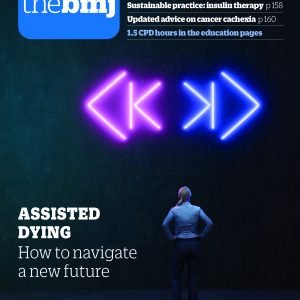
The World Health Organization (WHO) says that it is adhering to standard protocol in pursuing its transgender health guideline, but the process has been criticized for lacking transparency and an association with WPATH—an organization that supports the “gender affirming” approach, including hormones and surgery, for all ages—and is under fire for meddling with its own guideline development.
In The BMJ, freelance journalist Jennifer Block investigates these concerns and the questions they raise about how evidence based on the panel’s recommendations would be.
Earlier this year, documents emerged showing that two members of WHO’s guideline committee, in their capacity as executives of WPATH, had attempted to interfere with an independent evidence review commissioned from Johns Hopkins University for WPATH’s 2022 guideline, explains Block.
In emails seen by The BMJ, Karen Robinson, Johns Hopkins research lead, refers to submitting “reports of reviews (dozens)” to WPATH, but says “we have been having issues with this sponsor trying to restrict our ability to publish.”
WPATH denied prohibiting the team from publishing, but documents reveal there was concern among guideline authors that independent appraisals of the evidence would put them “in an untenable position” to protect affirming interventions from legislative restriction in minors.
Despite these revelations, the two members remain on WHO’s committee.
This is especially troubling to Zhenya Abbruzzese, cofounder of the Society for Evidence Based Gender Medicine (SEGM). “If WHO continues to ignore the evidence that two of its guideline development group members led a recent effort to suppress evidence related to treatments in this area,” she says, “it may harm WHO’s reputation in other areas of medicine, where its clinical guidance is sorely needed.”
WHO defended the makeup of its guideline group as well as its process, telling The BMJ it conducts “careful reviews on conflicts of interest” and that guideline development group members “act in their own expert capacity.”
Documents also reveal that, as WPATH’s guidelines were nearing publication, the organization was under external pressure from high up in the US government to remove minimum age recommendations for gender related hormones and surgeries, writes Block.
At first, WPATH declined to make the change because it would subvert its “consensus based” methodology. But when the American Academy of Pediatrics threatened to denounce the guidelines if this change wasn’t made, WPATH removed the ages entirely.
After the dispute between Johns Hopkins and WPATH, just one review was published. It found the strength of the evidence “low” in determining the effect of hormonal treatment on anxiety, depression, and quality of life, but it nevertheless concluded that such treatment “promotes the health and well-being of transgender people.”
Gordon Guyatt at McMaster University says, “All guidelines should be based on systematic reviews of the relevant evidence.” Furthermore, he says, “well conducted science that benefits the general community” should be available to all, so “it’s mysterious why Johns Hopkins didn’t publish” all the reviews it conducted, and it’s “problematic” that WPATH would “attempt to block publication.”
Even if the reviews were disseminated on preprint servers, says Carl Heneghan, director of the University of Oxford’s Center for Evidence-Based Medicine, “there are no excuses in this modern era for not making your data or your particular systematic review available.”
More information:
Dispute arises over World Professional Association for Transgender Health’s involvement in WHO’s trans health guideline, The BMJ (2024). DOI: 10.1136/bmj.q2227
Citation:
Researchers investigate dispute over US group’s involvement in WHO’s trans health guideline (2024, October 30)
retrieved 30 October 2024
from https://medicalxpress.com/news/2024-10-dispute-group-involvement-trans-health.html
This document is subject to copyright. Apart from any fair dealing for the purpose of private study or research, no
part may be reproduced without the written permission. The content is provided for information purposes only.








